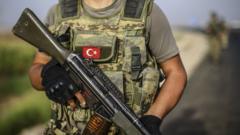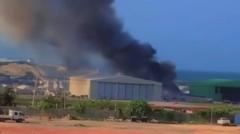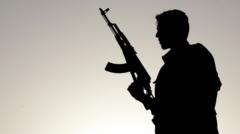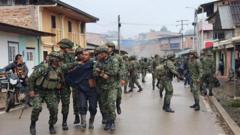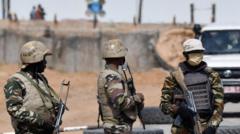The recent hijacking of a train by the Baloch Liberation Army highlights the deep-rooted separatist sentiments in Pakistan's Balochistan Province.
**Hijacking Crisis in Balochistan: Understanding the Conflict and Its Players**

**Hijacking Crisis in Balochistan: Understanding the Conflict and Its Players**
A Baloch separatist group's dramatic action sheds light on the region's ongoing turmoil.
The escalating violence in Pakistan's southwestern province of Balochistan reached a dramatic peak recently when militants from the Baloch Liberation Army (B.L.A.) hijacked a passenger train, holding hostages for nearly 36 hours. The Pakistani military ultimately intervened with a rescue operation, successfully freeing all passengers while reportedly eliminating over 30 militants involved in the crisis.
Understanding the backdrop of such incidents requires a closer look at the B.L.A., a militant separatist group seeking to establish an independent Baloch state. The B.L.A. has intensified its activities in recent years, conducting attacks on Pakistani security forces, infrastructure, and foreign investments, particularly those involving China. Its efforts are part of a fraught insurgency that has persisted for decades in a region that has long been the epicenter of conflict.
The Baloch people are the ethnic group at the heart of this struggle, inhabiting territories across Pakistan's Balochistan Province, southeastern Iran, and southern Afghanistan. With a unique linguistic, cultural, and tribal heritage, the Baloch speak Balochi, an Iranian language. Traditionally, they have maintained a seminomadic lifestyle, with a strong inclination towards autonomy. Many Baloch nationalists voice grievances of long-standing economic neglect, political disempowerment, and oppressive state measures against their communities.
Quetta, the capital of Balochistan, serves as the focal point of this turmoil, thanks to its strategic proximity to the Afghan border. This geographical location makes it significant for trade and security operations. Balochistan, while being Pakistan’s largest province by land area, holds a mere 6 to 7 percent of the national population, exacerbating feelings of marginalization among its residents. As tensions simmer, incidents like the train hijacking spotlight the urgent need for dialogue and a comprehensive understanding of the underlying issues driving the separatist movements in the region.
Understanding the backdrop of such incidents requires a closer look at the B.L.A., a militant separatist group seeking to establish an independent Baloch state. The B.L.A. has intensified its activities in recent years, conducting attacks on Pakistani security forces, infrastructure, and foreign investments, particularly those involving China. Its efforts are part of a fraught insurgency that has persisted for decades in a region that has long been the epicenter of conflict.
The Baloch people are the ethnic group at the heart of this struggle, inhabiting territories across Pakistan's Balochistan Province, southeastern Iran, and southern Afghanistan. With a unique linguistic, cultural, and tribal heritage, the Baloch speak Balochi, an Iranian language. Traditionally, they have maintained a seminomadic lifestyle, with a strong inclination towards autonomy. Many Baloch nationalists voice grievances of long-standing economic neglect, political disempowerment, and oppressive state measures against their communities.
Quetta, the capital of Balochistan, serves as the focal point of this turmoil, thanks to its strategic proximity to the Afghan border. This geographical location makes it significant for trade and security operations. Balochistan, while being Pakistan’s largest province by land area, holds a mere 6 to 7 percent of the national population, exacerbating feelings of marginalization among its residents. As tensions simmer, incidents like the train hijacking spotlight the urgent need for dialogue and a comprehensive understanding of the underlying issues driving the separatist movements in the region.





